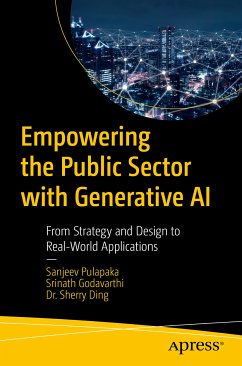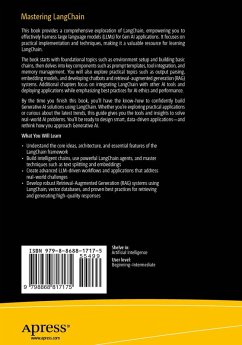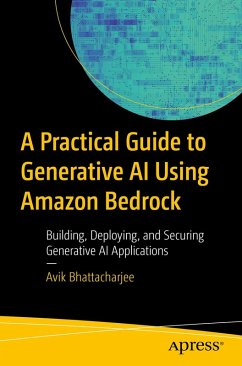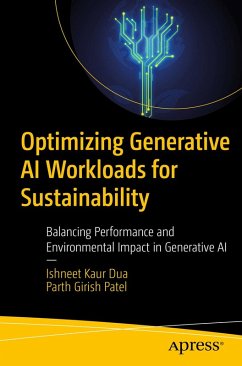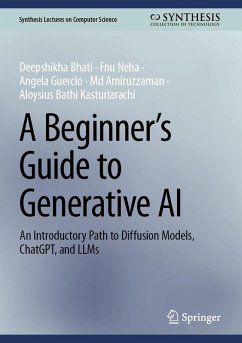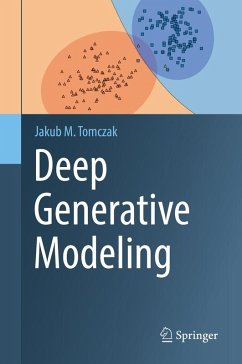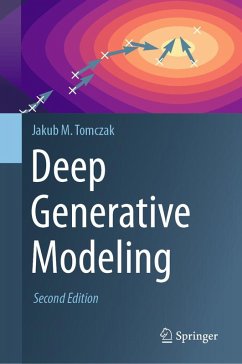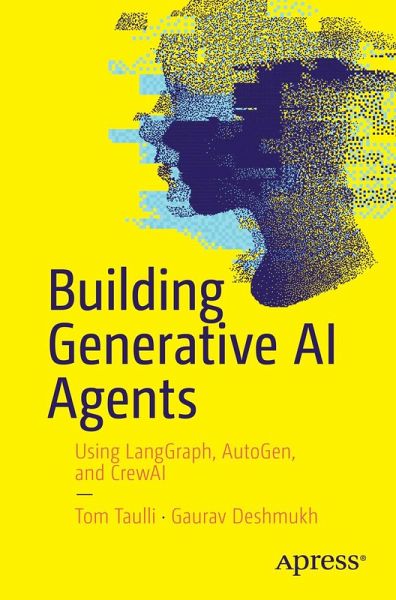
Building Generative AI Agents (eBook, PDF)
Using LangGraph, AutoGen, and CrewAI
Versandkostenfrei!
Sofort per Download lieferbar
43,95 €
inkl. MwSt.
Weitere Ausgaben:

PAYBACK Punkte
22 °P sammeln!
The dawn of AI agents is upon us. Tech visionaries like Bill Gates, Andrew Ng, and Vinod Khosla have highlighted the monumental potential of this powerful technology. This book will provide the knowledge and tools necessary to build generative AI agents using the most popular frameworks, such as AutoGen, LangChain, LangGraph, CrewAI, and Haystack.Recent breakthroughs in large language models have opened up unprecedented possibilities. After years of gradual progress in machine learning and deep learning, we are now witnessing novel approaches capable of understanding, reasoning, and generating...
The dawn of AI agents is upon us. Tech visionaries like Bill Gates, Andrew Ng, and Vinod Khosla have highlighted the monumental potential of this powerful technology. This book will provide the knowledge and tools necessary to build generative AI agents using the most popular frameworks, such as AutoGen, LangChain, LangGraph, CrewAI, and Haystack.
Recent breakthroughs in large language models have opened up unprecedented possibilities. After years of gradual progress in machine learning and deep learning, we are now witnessing novel approaches capable of understanding, reasoning, and generating content in ways that promise to revolutionize nearly every industry. This platform shift is as significant as the advent of mainframes, PCs, cloud computing, mobile technology, and social media. It's why the world's largest technology companies - like Microsoft, Apple, Google, and Meta - are making enormous investments in this category.
While chatbots like ChatGPT, Claude, and Gemini have demonstrated remarkable potential, the years ahead will see the rise of generative AI agents capable of executing complex tasks on behalf of users. These agents already exhibit capabilities such as running test suites, searching the web for documentation, writing software, answering questions based on vast organized information, and performing intricate web-based tasks across multiple domains. They can autonomously investigate cybersecurity incidents and address complex customer support needs. By integrating skills, knowledge bases, planning frameworks, memory, and feedback loops, these systems can handle many tasks and improve over time.
Building Generative AI Agents serves as a high-quality guide for developers to understand when and where AI agents can be useful, their advantages and disadvantages, and practical advice on designing, building, deploying, and monitoring them.
What You Will Learn
Who This Book Is For
Experienced software developers
Recent breakthroughs in large language models have opened up unprecedented possibilities. After years of gradual progress in machine learning and deep learning, we are now witnessing novel approaches capable of understanding, reasoning, and generating content in ways that promise to revolutionize nearly every industry. This platform shift is as significant as the advent of mainframes, PCs, cloud computing, mobile technology, and social media. It's why the world's largest technology companies - like Microsoft, Apple, Google, and Meta - are making enormous investments in this category.
While chatbots like ChatGPT, Claude, and Gemini have demonstrated remarkable potential, the years ahead will see the rise of generative AI agents capable of executing complex tasks on behalf of users. These agents already exhibit capabilities such as running test suites, searching the web for documentation, writing software, answering questions based on vast organized information, and performing intricate web-based tasks across multiple domains. They can autonomously investigate cybersecurity incidents and address complex customer support needs. By integrating skills, knowledge bases, planning frameworks, memory, and feedback loops, these systems can handle many tasks and improve over time.
Building Generative AI Agents serves as a high-quality guide for developers to understand when and where AI agents can be useful, their advantages and disadvantages, and practical advice on designing, building, deploying, and monitoring them.
What You Will Learn
- The foundational concepts, capabilities, and potential of AI agents.
- Recent innovations in large language models that have enabled the development of AI agents.
- How to build AI agents for launching a product, creating a financial plan, handling customer service, and using Retrieval Augmented Generation (RAG).
- Essential frameworks for building generative AI agents, including AutoGen, LangChain, LangGraph, CrewAI, and Haystack.
- Step-by-step guidance on designing, building, and deploying AI agents.
- Insights into the future of AI agents and their potential impact on various industries.
Who This Book Is For
Experienced software developers
Dieser Download kann aus rechtlichen Gründen nur mit Rechnungsadresse in A, B, BG, CY, CZ, D, DK, EW, E, FIN, F, GR, HR, H, IRL, I, LT, L, LR, M, NL, PL, P, R, S, SLO, SK ausgeliefert werden.



